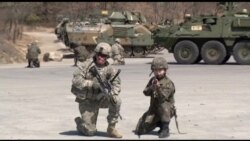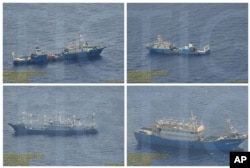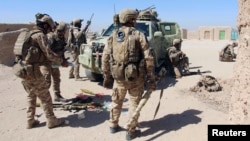U.S. campaign rhetoric critical of international trade deals and threats of possibly withdrawing military forces from Asia are being discounted by many observers in the region, who say American interests abroad remain constant and the problems facing the next president remain complicated.
Both Republican nominee Donald Trump and Democratic nominee Hillary Clinton have been critical of free trade policies, especially the yet to be ratified Trans Pacific Partnership (TPP), reflecting the rising public anger expressed in this campaign over the loss of American jobs over the last few decades.
However, the TPP is also intended to give U.S. companies more access to markets in Asia to counter China’s growing economic power.
China
Clinton initially argued in favor of TPP when she was secretary of state, saying in 2012 that it was the “gold standard in trade agreements” but changed her position during the campaign.
Trump has been particularly hard on China, accusing Beijing of manipulating the value of its currency to gain an unfair trade advantage, and threatening to impose punitive tariffs on Chinese goods. Economists say such tactics could spark a trade war that would hurt both economies.
Clinton has been more critical of China’s human rights abuses and its increasingly aggressive moves to claim territory in the South China Sea that is estimated to have vast oil and gas reserves and is an important international trade route.
Political science professor Xie Tao with Beijing Foreign Studies University expects the public criticisms of China lodged during the campaign to be softened and addressed through traditional diplomatic channels after the election. He is reminded of the 1992 campaign when Bill Clinton at one point called the Chinese leadership the “butchers in Beijing.”
“And then look what happened after he became president. It was kind of a bad beginning, but after 1994 when he decided to delink human rights with trade with China, it was smooth sailing from then on out for U.S.-China relations,” said Xie.
North Korea
On how the U.S. should respond to the advancing North Korean nuclear threat, Clinton has voiced support for the status quo policy of maintaining strong military alliances in South Korea and Japan to provide deterrence, and to work with China to increase economic sanctions on the Kim Jong Un government.
Trump has said he would demand that China, North Korea’s principal economic trading partner, force its ally to halt its nuclear program.
Beijing is reluctant to strictly implement measures that could lead to instability on its border or the collapse of the Kim government, that would likely result in a unified Korea under the control of Seoul and in alliance with Washington.
The Republican nominee has also been critical of military allies South Korea and Japan for not bearing enough of the financial burden for American forces stationed in their countries. Trump has suggested he would pull troops and allow allies in the region to develop their own nuclear weapons if they did not agree to pay the U.S. more for protection.
But professor Kim Hyun-Wook at the Korea National Diplomatic Academy discounts Trumps rhetoric as a flexible negotiating position and expects that no matter who wins in November, the next U.S. president will want a strong U.S. military presence in the region.
“I think the relationship will be very solid whoever becomes president. Of course according to each candidate’s policy towards Asia and (especially) to their ally in South Korea there might be some tension and adjustments and refinement, but I think the alliance itself will be very solid,” said professor Kim.
South Asia
While both candidates have clashed in debates over how to defeat the Islamic State in Syria and Iraq, there has been little focus on the situation in Afghanistan, which continues to be dangerous despite 15 years of U.S. military involvement.
The United States formally ended combat operations in Afghanistan at the end of 2014, but close to 10,000 American troops remain in country as part of an international force participating in counterterrorism operations and training missions.
The expectation was that these troops would be withdrawn as more Afghan security forces were trained and deployed. However, the Taliban pushed back the Afghan forces, regaining control of more territory in the last year.
Recent negotiations between Afghan and Taliban leaders in Qatar, reportedly with a U.S. diplomat participating, have so far failed to reach any settlement.
And Afghan and U.S. leaders remain wary of involving Pakistan, even though many Taliban leaders find safe haven there.
“I’m afraid that whether it is the Clinton presidency or a Trump presidency, I think the United States will continue to struggle to know what to do and how to do it in Afghanistan, partly because of the ingrained bias in Washington DC against Pakistan,” said Mosharraf Zaidi, a columnist for The News, one of Pakistan’s largest English-language newspapers.
Neither Trump nor Clinton has advocated sending in more U.S. forces into Afghanistan.
VOA foreign correspondents Bill Ide in Beijing and Ayesha Tanzeem in Islamabad contributed to this report.









